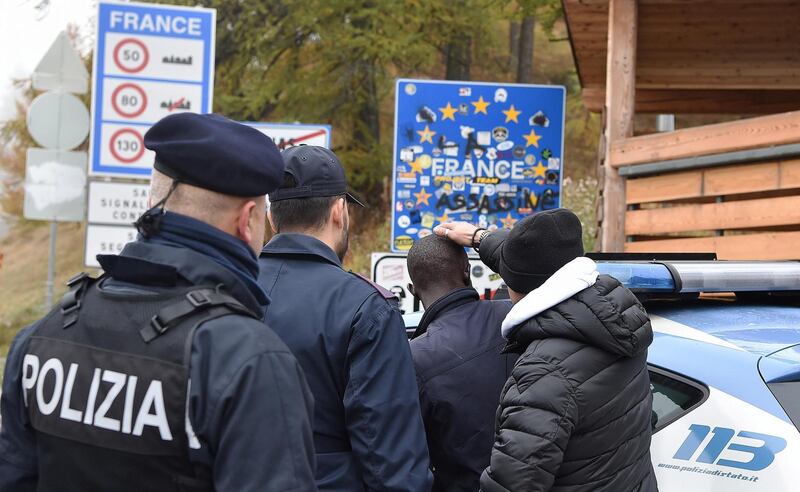In the span of a couple of weeks, Italy’s populist League party banned a migrant-friendly mayor from Riace, denied school meals and bus services to 200 migrant children in Lodi and called for the closure of ethnic shops by 9pm in Rome.
The flurry of xenophobic policies does not justify the alarmism on the resurgence of a fascist regime in Italy, analysts told The National. But, if unchallenged, these policies threaten to demonise – and potentially begin to tarnish – Italian democracy.
During the last rally before the March national elections, League leader Matteo Salvini swore on the gospel “to be loyal to my people, 60 million Italians”. Despite the party's former leader being convicted for embezzlement, Mr Salvini’s motto “the League is the people, and the people cannot be stopped” still strikes a chord with the Italian electorate.
“The League is extremely present on the ground and is working to be even more present,” said Benedetto Coccia, research co-ordinator at the think tank Istituto Pio V in Rome. While it brands itself as a new force advocating for change, the party is the oldest running electoral force, the analyst noted.
Established in 1991, the League – formerly known as Northern League – has been spreading its roots in the peninsula, gradually making a foray into the disparaged south.
The League picked up on growing popular resentment spurred by the economic crisis and the mismanagement of the migrant flow to “market itself as the problem-solver”, Mr Coccia said.
_______________________
Read more:
Secret filming puts Italy on notice for new political scandal
Italy expects EU budget rejection on Tuesday
_______________________
But theirs are easy solutions to complicated problems. “Ours is not a direct democracy, it is a system with checks and balances. What I find worrying is that these very checks and balances are now being pointed out to the public opinion as the problem.”
This builds a narrative where the League is the arm of the people while the state is the stick. Under this logic, if a budget law is marketed as belonging to “the people”, the court of audit cannot stop it without coming off as an authoritarian agency, the analyst said.
Similarly, by preventing an Italian migrant rescue ship from docking Mr Salvini “sends [a precise] message: If it were for me, they would not have been allowed to dock. The state’s rules are preventing me from doing what you would like me to,” the analyst said.
The demonetisation of Italian state institutions, in turn, nurtures Mr Salvini’s image as the strong leader willing to break the rules.
The proposed closure of little ethnic shops managed by migrants by 9pm and the exclusion of migrant children from bus services and school meals in Lodi “is part of the logic of ‘zero tolerance’ on immigration”, Mr Coccia said.
Riace, a town famed for taking in migrants and hailed as a success story, was an ideal target to send out such a message. Following accusations of mismanaging funds, mayor Domenico Lucano was put under house arrest and later banned from living in his hometown – a measure historically reserved only for mafia bosses.
“It does not matter whether integration is successful or not. What matters is affirming that there will be no tolerance towards immigrants,” the analyst said.
Since March, support for the League soared from 17 per cent to about 30 per cent, a poll by Ipsos revealed. Among Catholics who attend mass at least once a week – about a third of Italians – support for Mr Salvini has doubled, from 15.7 per cent in March to 31.8 per cent in July. Conversely the popularity of Pope Francis – who called on Italians to open their doors to refugees – dropped from 88 per cent in 2013, when he was elected, to 71 per cent. Among the key reasons, according to the poll’s author, Ilvo Diamanti, is migration.
In 2017, a survey by Demos found that half of Italians perceived migrants as a threat – the highest percentage yet recorded.
According to Francesco Anghelone, a researcher at Istituto Pio V studying the rise of sovereignist parties across Europe, the European Union did not prove itself able to tackle the issue of immigration.
“The attitude has been that of closure and countries that were already facing economic problems were left to bear the burden,” Mr Anghelone said. As a consequence, the message spread by parties who wish to reclaim the sovereignty has been an easy sell.
“The European Union is now failing to represent what it did at the end of War World II: a place where citizens could find economic growth, greater civil rights and justice,” Mr Anghelone said.
But while the Luxembourg Foreign Minister Jean Asselborn accused Mr Salvini of using "fascist" methods in a spat over immigration, Mr Anghelone dismissed such claims. The League leader was also criticised for using fascist slogans.
“As things stand, I do not see the danger of drifting back into fascism,” he said.
In March, the League won only 17.37 per cent of the votes, later sticking an unlikely coalition with the Five Star Movement which had scored little over 32 per cent.
The party is also diverse and some administrations identify more with Italy’s historic Christian Democratic party, while others drift more towards the far right.
What needs to be addressed, however, is the fact that the League – like other parties in Europe – are building consent over the failures of the European Union. Last week, a survey conducted by Eurobarometro revealed that one Italian in two would like to exit the European Union – the highest percentage in Europe, including among UK voters.
“The League is successful in cynically and efficiently exploiting themes that are close to the people,” Mr Anghelone said. “The EU should think long and hard about its mistakes.”






